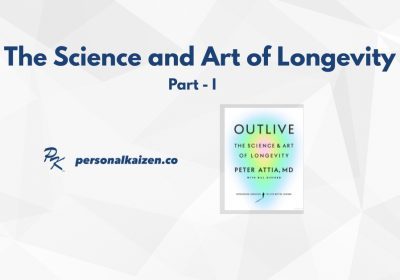
Last month we shared part one of our summary of the Peter Attia book, Outlive: The Science and Art of Longevity. We described Attia’s focus on healthspan over lifespan; all of us want to maintain an excellent standard of living as we grow older. Part one covered the importance of exercise and strength training. This second half of the book summary shares Attia’s recommendations for:
- Nutrition,
- Sleep,
- Emotional Wellbeing and
- Detection
Why Don’t Doctors Learn Nutrition in Med School?
Attia is amazed at how little time he spent in school studying nutrition, yet “you are what you eat.” Attia prefers a personalized approach to nutrition but hesitates to recommend a specific diet. He does note the potential benefits of low-carbohydrate or ketogenic diets and shares how he personally benefitted from continuous glucose monitoring.
Here are Attia’s basic nutrition suggestions:

- Never go on a diet. Instead, eat healthy foods and not too much or too little.
- Eat plenty of protein in your diet. Proteins are the building blocks for our muscles, our enzymes, and many of the most important hormones in our body. Consume from 0.6 to 1.0 grams of protein per pound of body weight spread out over the day.
- Reduce your sugar intake and avoid all sweet drinks like sodas and fruit juice. Continuous glucose monitoring will help you see how your body deals with sugar.
- Obtain the vitamins, minerals, and essential fats you need. Many people obtain this by eating healthy foods, but Attia and I supplement with Vitamin D, fish oil, and magnesium tablets.
- Avoid pathogens like E.coli and toxins like mercury and lead.
In the past, Attia would regularly go on day-long fasts. He still recommends this to patients with the most severe metabolic dysfunction but no longer fasts himself. There are many benefits of fasting, but he believes that the loss of muscle is not worth the trade-off.
Sleep and Emotional Wellbeing
Outlive: The Science and Art of Longevity has chapters dealing with rest and recovery and mental health, even describing Attia’s own struggles.
Attia notes that doctors all have a period of “residency” in their education when they essentially live at a hospital, working long shifts and not sleeping well. He developed many bad habits during this period and nearly died driving home from a long shift one night.

It is important to get enough quality sleep for cellular repair and hormonal balance. Sleep is also when our brain heals itself; while we are in deep sleep our brains are “cleaning house,” sweeping away intracellular waste that has built up between our neurons. We have covered the topic of sleep before. Attia is not an expert himself, and the inputs and suggestions that Attia shares are in this previous post.
The book concludes with a section detailing Attia’s struggles with overachievement and anger, stemming from traumatic incidents as a child. Attia explains how he has benefitted from counseling, dialectical behavioral therapy (DBT), and support to improve his emotional well-being. This section was highly personal to him and hard to share, but you shouldn’t ignore the role of stress management and mental health in overall health and longevity.
Early Detection Significantly Increases Healthspan
The final tip from Attia is to ensure you take advantage of testing to detect issues you wouldn’t notice otherwise.
The most important tool in our anticancer arsenal is early, aggressive screening. Earlier-stage cancers comprise fewer total cancerous cells, with fewer mutations, and thus are more vulnerable to treatment with the drugs that we do have, including some immunotherapies.
Early detection is our best hope for radically reducing cancer mortality.
- Yearly mammograms are recommended for women after age 40, or earlier if you are higher risk. Woman also need regular pap tests starting at age 25.
- Obtain colonoscopies beginning at the age of 45 every 5 years (more often than others recommend). Colon cancer has been documented to appear within the span of as little as six months to two years after a normal colonoscopy.
- Regularly schedule visual examinations to detect skin cancer and melanomas.
- Consider low-dose CT scans for lung cancer. Note that 15% of lung cancers are diagnosed in people who have never smoked.

Attia currently practices as a doctor focused on longevity. Here are additional tests he schedules for his patients:
- An annual DEXA scan focused on visceral fat rather than total body fat.
- Blood testing for apoB, a measure of atherosclerotic cardiovascular disease (ASCVD) risk. If you have a history of premature heart attacks in your family, you should also ask for an Lp(a) test (a specific lipoprotein).
Detection is still the best way to prevent many genetic issues that you can’t deal with any other way.
Summary
We hope you will use the information in our summary of the book Outlive to improve your life and daily habits. Let us know what you have already done or plan to do to improve your healthspan in the comments below.




